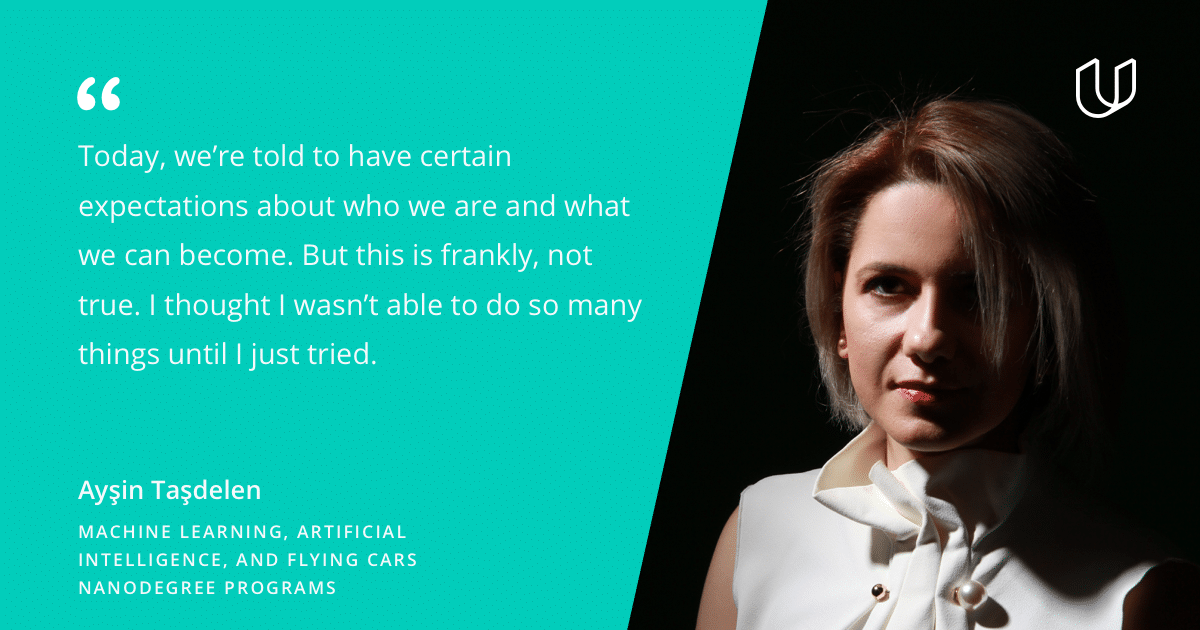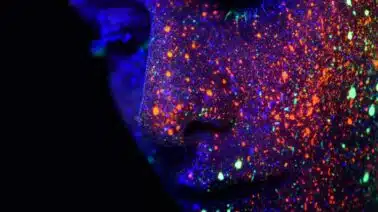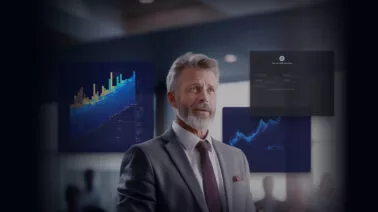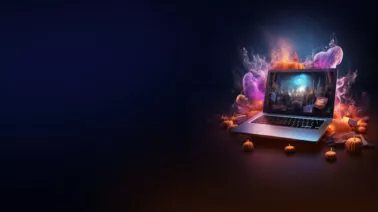Find the right nanodegree program for you.
In a continuation of celebrating this year’s Women’s History Month, we would like to introduce Ayşin Taşdelen, an artificial intelligence professional and three-time Nanodegree program graduate. She has let her curiosity and desire for new skills lead her through three Nanodegree programs, new jobs, and side projects.
We recently had a chance to speak with Ayşin to hear about her motivations and interest in pursuing cutting-edge technologies.
You studied mathematics during your university years and then became a programmer, what were some of your initial career goals?
I really enjoyed my university studies, so much so, that I initially looked into becoming a full-time researcher. Leaving academia was a tough decision, I loved learning but also knew that starting a traditional career would help me financially. I decided to go the career route and follow my interest in computer science. My initial career goal was to land a job and improve my programming skills.
As your career has developed, how have you satiated your desire to learn?
Over the years, I have tried to keep up with industry articles and books about the latest computer and tech trends. As the internet surged, I started using online library subscriptions and video learning paths. Reading and watching videos were great, but they only get you so far; I never felt like I was learning enough about a subject or concept, until, Udacity.
How were you introduced to Udacity and how did you choose your first Nanodegree program, Machine Learning?
I had spent eight years working as a software engineer, was in the midst of completing a master’s degree in Business Information Systems, and was setting myself up to be a manager. Up until this point, I had read about artificial intelligence, autonomous systems, machine learning, all of this advanced stuff, but thought that those industries and concepts were out of reach, my future was in IT management.
All of this changed when I read a blog post about TensorFlow by a highly regarded author who was working on a project that predicted butterfly breeds based on images (I also take butterfly photos!). I was amazed by the models and predictions the engineer could create. This is when I started to search for online opportunities to learn more about deep learning. That’s when I found Udacity.
While browsing through Nanodegree programs I saw a familiar name, Peter Norvig, involved with the Artificial Intelligence Nanodegree program. Previously, I had listened to a number of his lectures and was amazed by his teaching. Without a second thought, I applied to the AIND program—and got rejected.
I decided to finish out my master’s degree over the next six months and take another look at Nanodegree programs when I had more time and could select a foundation program that would lead to the AI program. Six months later, I graduated with my master’s degree and enrolled in the Machine Learning Engineer Nanodegree program.
I’m working on a Deep Learning Classical Art project … We’re using deep learning to collect and explore patterns in ancient Turkish art genres; collecting data about particular genres and classifying them by artist.
How was the experience? Did you encounter challenges?
I found the content to be so clear and concise. Concepts that previously seemed complex were broken down and made easy to understand. Watching videos and then completing projects associated with the content, filled the gaps I had noticed in my previous online learning efforts when I felt as though I wasn’t absorbing any skills.
The projects were challenging; I found that if I didn’t focus on the requirements exactly, I would spend time going back and fixing things. At one point, I submitted a project four times, but I stayed dedicated and pushed myself to keep going. Once I figured out how to focus on the project requirements, I was able to navigate through lessons more quickly. When I completed the Machine Learning program, I immediately enrolled in another.
In addition to the Machine Learning Nanodegree program, you’ve gone on to complete two more Nanodegree programs—what motivates you to keep learning?
All of these technologies are extremely exciting! I am constantly impressed by the scientists who are changing the world with their discoveries. Artificial intelligence, I believe has the most opportunity to bring change for all of us. As a programmer, I’ve always thought, much like every programmer, that my utmost mission is in moving frontiers to the next level, and AI is the way to do that. With the machine learning program, I created a foundation; with the Artificial Intelligence Nanodegree program, I solidified my passion and gained the skills to apply AI principles; and with the Flying Car and Autonomous Flight Engineer Nanodegree program, I’ve learned how AI can be applied to the 3D world.
I am working alongside industry experts; three aeronautics Ph.D. students and the first three alumni to complete the Flying Car Nanodegree program—one of whom is myself!
You recently landed a new software engineering role that utilizes deep learning; did your Udacity learnings impact your ability to land this recent role?
Yes! I was recruited for an Android Developer role, but in the interview, they mentioned they were working to incorporate facial recognition software and computer vision into their products. The company manufactures gates for properties, and they’re working to make something as simple as an entryway, smarter.
I shared more on my Udacity studies, my interest in AI and computer vision, and they were intrigued. I accepted their offer as a Mobile App Developer and worked on that team for a short period, but recently, I started working on a computer vision project. Additionally, I am leading an effort that involves applying deep learning methods to one of our other initiatives.
Beyond work, do you use your new skills on any side projects?
I participated in the Alpha Pilot challenge organized by Lockheed Martin, which is the first AI and drone racing competition! I am so excited about this competition. Our team is working to pass the first stage and hopefully see our drone race against other teams. The opportunity to work on this team is particularly awesome; I had seen a video from similar groups on LinkedIn and thought “What the heck to do I know? I could never participate in this challenge.”
When I saw Alberto Naranjo Galet, a fellow Udacity Alumni, announce that he was looking for teammates to join the Velocity Vector team to enter the competition, I went for it! It’s an incredible experience. I’m working with people like Nuno Marques, a PX4 contributor and a leader in the drone community. I am working alongside industry experts; three aeronautics Ph.D. students and the first three alumni to complete the Flying Car Nanodegree program—one of whom is myself!
I’m also excited about working on a Deep Learning Classical Art project with a professor, Şebnem Özdemir, who invited me to participate based on my skills gained through Udacity. We’re using deep learning to collect and explore patterns in ancient Turkish art genres; collecting data about particular genres and classifying them by artist. We’re focused on one art form, Ebru, which I’ve always loved but never had the time or finances to pursue classes in during university.
My university is located in the old city of Istanbul, where this art form is abundant and many masters teach courses about it. Through this project, I am able to study alongside masters and learn this unique art form. With this project, I am living three of my life goals:
- Continue my journey to becoming an Ebru Master, through the master-apprenticeship program, lead by Yılmaz Eneş
- Being a team lead
- Working as a researcher
Without the skills I obtained through Udacity and the professor running this project, I would never have had this opportunity.
You have accomplished so much! What’s next?
I don’t think I’ve accomplished so much yet! I feel like I triggered the start of a lifelong journey by learning at Udacity, and have so far had the chance to apply what I learned both in industry and academia.
Today, we’re told to have certain expectations about who we are and what we can become; there are so many prerequisites and rules. But this is frankly, not true. I thought I wasn’t able to do so many things until I just tried. I went from a Software Engineer to a Deep Learning and Computer Vision Engineer, who is working on a drone team and advancing the research of classical art. Anything is possible!
My dream is to spend the rest of my life working on new discoveries in AI and computer vision, to find ways to make the world a better place. I hope I can leave something behind or at least contribute to an advancement in tech which the rest of the world can benefit from. This is what I’ll be working towards each and every day.
With a blossoming career and prioritizing always building your skills, how would you inspire others to continue their own learning journey?
When I first started my software engineering career there was no one for me to talk for guidance or friends from college with similar experiences. I’m trying to share my experience and knowledge with others, something I would have wanted so badly back then.




